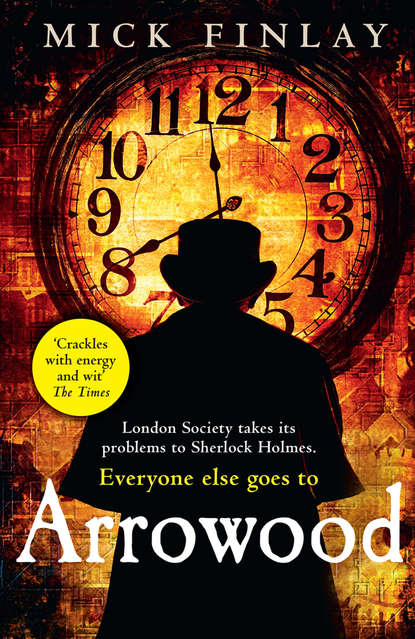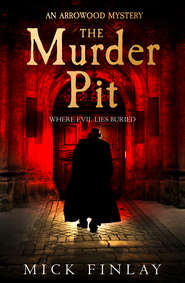По всем вопросам обращайтесь на: info@litportal.ru
(©) 2003-2024.
✖
Arrowood
Автор
Год написания книги
2019
Настройки чтения
Размер шрифта
Высота строк
Поля
‘Do you think so?’ asked the guvnor, his chest inflating. He smoothed the hair around his crown. ‘I’ve been thinking of commissioning a picture for some time. I think my sister would very much like a portrait above the fire.’
I looked at him, unable to suppress a smile at the thought of such a gift.
‘We can book it in now, sir. Shall we say Monday morning? Eleven o’clock?’
‘Yes . . . Ah. Wait. On second thoughts, I’d better wait until I’ve taken possession of my new suit. But might we speak to Miss Cousture now? On a personal matter.’
The artist looked down his long nose at us for some time.
‘It’s important, Mr Fontaine,’ I said, growing impatient. ‘Is she here?’
With a theatrical sigh and a shake of his lank black hair, he disappeared behind a curtain at the back of the store. A moment later Miss Cousture appeared.
‘Good day, Mr Arrowood,’ she said quietly as she swept through the curtains. She was wearing a high-waisted black skirt, a white blouse rolled to her sleeves, her hair pinned up on her head. She nodded at me. ‘Mr Barnett.’
Mr Fontaine appeared behind her and stood by the curtain, his arms crossed.
She flicked her eyes at her employer as if to warn us not to talk. There followed a silence. Her pale cheeks coloured. She looked at her boots.
‘Would you mind if we have a private moment with the lady, sir?’ asked the guvnor finally. Noticing that his tie had blown over his shoulder from the breezy street, I stepped forward and flipped it back. He took a quick backward swipe at me.
‘This is my studio, sir,’ said the man with a sniff. He rubbed his long nose quickly. ‘The name above the door is mine, not the lady’s. If you have something to say, get on and say it.’
‘Then will you come outside, madam?’
‘Oh, putain, Eric!’ she cursed, turning to her employer. ‘One moment, that is all!’
On the lips of this fine woman, the profanity turned the air cold. Fontaine threw his head back and ducked behind the curtain. We heard his angry footsteps on the stairs.
The guvnor pulled a chair from behind the counter and lowered himself down with a wince. He rubbed his feet through his tight boots. For some time he didn’t speak.
‘We need to ask you a few more questions, miss,’ he said at last.
‘Of course. But I tell you all I know.’
‘We must know what trouble your brother was in,’ he said, a pained smile on his red face. ‘Any small thing he might have said. Please be quite open with us.’
‘Of course.’
‘Did you know his friend Martha?’
She shook her head.
‘His sweetheart. You didn’t know about her?’
‘I never heard the name.’
‘Well, Miss Cousture, I’m afraid to say she was murdered this afternoon.’
We watched as her face turned from surprise to sadness. She gripped the counter and lowered herself onto the stool.
‘We had an appointment to meet but someone got to her first,’ explained the guvnor.
She nodded slowly.
‘We also discovered there was some trouble in the Barrel of Beef just before Thierry disappeared. The only clue we have is that it might involve an American. Did Thierry mention any such thing to you?’
‘An American?’ she said, a disappointed tone in her voice. ‘No, never. What is the name?’
‘We don’t have a name. All we know is that the day your brother disappeared there was an argument involving an American. We don’t even know for sure Thierry was involved. But please think again. Did anything happen before he disappeared? Was there any change in him?’
‘Only when he comes to me for money. The last time I see him, I tell you he’s scared.’ She paused, her eyes travelling quickly from the guvnor to me and back again. ‘Do you think he’s dead? Is that what you mean by “trouble”?’
The guvnor took her hand and held it.
‘It’s too early to think of that, miss.’
She was about to speak again when Mr Fontaine swept back through the curtain. This time he would not be budged.
We walked back towards Waterloo. The air was still and a fog had descended.
‘Barnett,’ said the guvnor at length. ‘Was there anything that struck you as odd about what we’ve just seen?’
I thought for a bit, trying to guess what he’d noticed.
‘Not as I could say,’ I said at last.
‘Tell me, if Mrs Barnett had disappeared without taking her clothes or her papers, and you’d appointed a detective, and let’s imagine that two days later the detective came to see you. You’re quite mad with worry, remember.’
‘Yes, sir.’
‘What would be the first thing you would say to him?’
‘I suppose I’d ask if he’d found her.’
‘Exactly, Barnett.’ His brow tensed. ‘Exactly.’
The guvnor continued home to ponder this development, while I returned to the White Eagle. I had myself a bowl of oysters and then a plate of mutton as I waited, and then a glass of porter, and then another. It was a noisy night, and I was happy enough to sit in the corner and watch my fellow citizens larking about under the great looking glass as stretched the length of the ceiling. Later on, the match-seller trudged in. He looked at no one as he made his way across the syrupy floor, but held his face in a rictus in case he should launch into some anarchic pantomime. He paid, took his glass, and went to hide in his usual corner behind the glass panel.
When the crowd began to thin, Ernest stumbled in and stood at the same place at the bar as before. He took himself a gin and drank it quick, his back hunched over the counter. He wore the same thick clothes as before, and didn’t appear to see anyone around him except the barmaid, who slammed his drink before him as if he’d insulted her mother.
‘Good to see you again, my friend,’ I said, placing a second glass before him. ‘Come sit at my table. I could do with a bit of company.’
He looked up with confusion in his eyes. He glanced at the gin, then back at me. A trickle of blood from his gums ran down his single remaining front tooth.
‘Eh?’ he said at last.
‘We met the other night, Ernest. Here. Two nights ago.’






